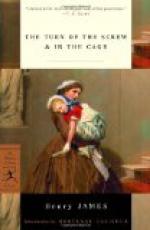She had only two torments; the greatest of which was that she couldn’t, not even once or twice, touch with him on some individual fact. She would have given anything to have been able to allude to one of his friends by name, to one of his engagements by date, to one of his difficulties by the solution. She would have given almost as much for just the right chance—it would have to be tremendously right—to show him in some sharp sweet way that she had perfectly penetrated the greatest of these last and now lived with it in a kind of heroism of sympathy. He was in love with a woman to whom, and to any view of whom, a lady-telegraphist, and especially one who passed a life among hams and cheeses, was as the sand on the floor; and what her dreams desired was the possibility of its somehow coming to him that her own interest in him could take a pure and noble account of such an infatuation and even of such an impropriety. As yet, however, she could only rub along with the hope that an accident, sooner or later, might give her a lift toward popping out with something that would surprise and perhaps even, some fine day, assist him. What could people mean moreover—cheaply sarcastic people—by not feeling all that could be got out of the weather? She felt it all, and seemed literally to feel it most when she went quite wrong, speaking of the stuffy days as cold, of the cold ones as stuffy, and betraying how little she knew, in her cage, of whether it was foul or fair. It was for that matter always stuffy at Cocker’s, and she finally settled down to the safe proposition that the outside element was “changeable.” Anything seemed true that made him so radiantly assent.
This indeed is a small specimen of her cultivation of insidious ways of making things easy for him—ways to which of course she couldn’t be at all sure he did real justice. Real justice was not of this world: she had had too often to come back to that; yet, strangely, happiness was, and her traps had to be set for it in a manner to keep them unperceived by Mr. Buckton and the counter-clerk. The most she could hope for apart from the question, which constantly flickered up and died down, of the divine chance of his consciously liking her, would be that, without analysing it, he should arrive at a vague sense that Cocker’s was—well, attractive; easier, smoother, sociably brighter, slightly more picturesque, in short more propitious in general to his little affairs, than any other establishment just thereabouts. She was quite aware that they couldn’t be, in so huddled a hole, particularly quick; but she found her account in the slowness—she certainly could bear it if he could. The great pang was that just thereabouts post-offices were so awfully thick. She was always seeing him in imagination in other places and with other girls. But she would defy any other girl to follow him as she followed. And though they weren’t, for so many reasons, quick at Cocker’s, she could hurry for him when, through an intimation light as air, she gathered that he was pressed.




